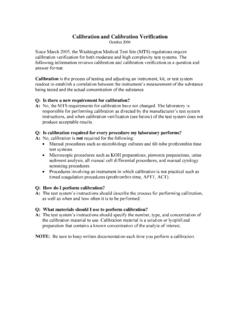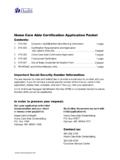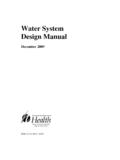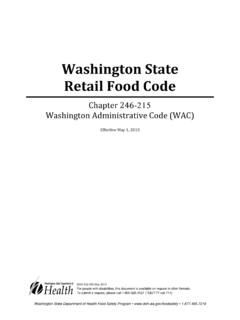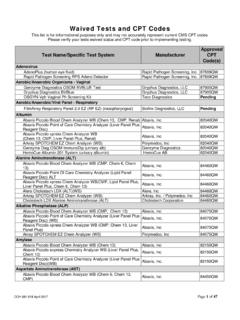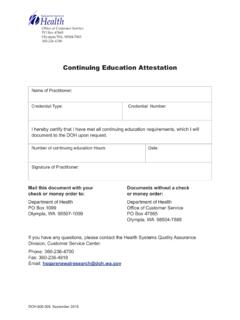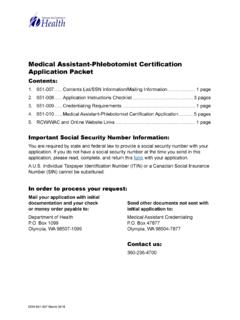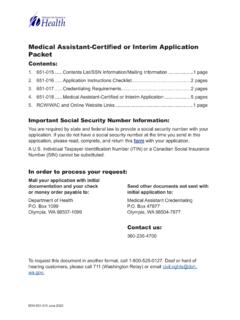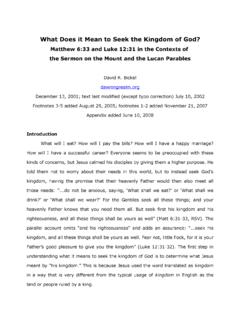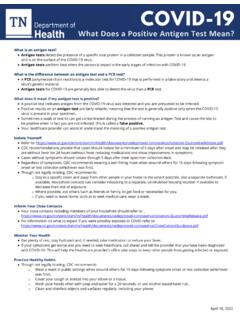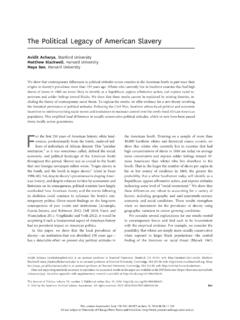Transcription of Your COVID -19 test results are negative
1 Updated June 16, 2020 To request this document in another format, call 1 -800-525-0127. Deaf or hard of hearing customers, please call 711 (Washington Relay) or email Your COVID -19 test results are negative What does a negative test mean? Thank you for taking a COVID -19 test. Your negative test results mean that you probably weren t infected when your sample was collected. However, your results do not rule out COVID -19. It could take about five days after you are exposed to the virus for it to show up enough in a sample from your nose to be detected by this test. So, you could have it, but the test may not show it for a while. Whether you test positive or negative for COVID -19, you still should take preventive measures to protect yourself and others.
2 What kind of test did you use, and why? We used a Viral PCR test. Specimens processed by PCR-based technology are the only federally approved tests that can be used to make a diagnosis of COVID -19. At this time, specimens sent to federally certified labs for PCR-based tests are better able to detect COVID -19 than currently available point-of-care tests performed outside of laboratories. How does the PCR test work? The PCR test tells you whether you have a current infection. It works by detecting the genetic material specific to this virus within all the genetic material in the sample from your nose. Why didn t you use an antibody test? An antibody test tells you whether you had a previous infection.
3 An antibody test may not be able to show whether you have a current infection, because it can take 1 3 weeks after becoming infected to make antibodies. We don t know yet whether having antibodies to the virus can protect someone from being infected with the virus again, or how long that protection might last. Why was I required to take the test? People who live with groups of people, such as those in nursing homes, have been, and continue to be, severely impacted by COVID -19. Because of that risk, the state is asking all residents and staff to be tested for COVID -19. results will help to limit the spread of COVID -19 to residents and the people who care for them. How will the state use the results of these tests ?
4 Testing all the people who live in nursing homes or other care settings, and the staff who care for them, will help to identify people who are infected but have no symptoms. This will help to identify cases earlier, and inform prevention and control efforts to limit transmission among residents and staff. Scientists can also use this information to understand how COVID -19 affects people and how it spreads. Updated June 16, 2020 To request this document in another format, call 1 -800-525-0127. Deaf or hard of hearing customers, please call 711 (Washington Relay) or email Next steps? Washington s COVID -19 testing strategy for the next six months prioritizes testing for people who have symptoms of COVID -19, people who are close contacts of people who have the infection, and the people who live in congregate settings where a person infected with COVID lives.
5 The strategy also recommends routine testing of people who do not appear to be sick but who are at high risk of infection and transmission due to their employment or living conditions. Where can I get more information? If you have questions about your COVID -19 test results , contact your medical provider. If you want more information about COVID -19, visit the state Department of Health s COVID -19 webpage. More COVID -19 Information and Resources Stay up-to-date on the current COVID -19 situation in Washington, Governor Inslee s proclamations, symptoms, how it spreads, and how and when people should get tested. See our Frequently Asked Questions for more information. The risk of COVID -19 is not connected to race, ethnicity or nationality.
6 Stigma will not help to fight the illness. Share accurate information with others to keep rumors and misinformation from spreading. WA State Department of Health 2019 Novel Coronavirus Outbreak ( COVID -19) WA State Coronavirus Response ( COVID -19) Find Your Local Health Department or District CDC Coronavirus ( COVID -19) Stigma Reduction Resources Have more questions about COVID -19? Call our hotline: 1-800-525-0127. For interpretative services, press # when they answer and say your language. (Open from 6 to 10 ) For questions about your own health, COVID -19 testing, or testing results , please contact your health care provider.
